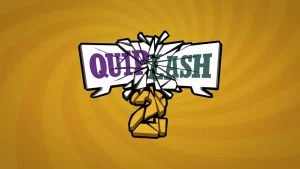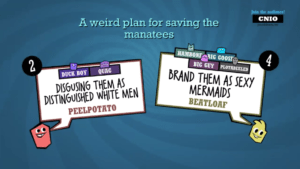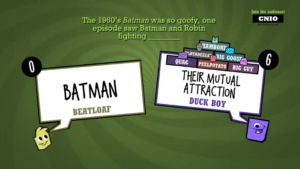
I played Quiplash 2 from Jackbox Party Pack 3 remotely in the browser with a group of 8 friends (myself included), the maximum allowed. Quiplash is a fast-paced game in which players anonymously submit answers to prompts provided by the game and then the group anonymously votes on which response to each prompt was funniest (with the identities of the authors and voters revealed after the fact). For the first two rounds, each prompt is only answered by two players, but in the third and final round, all players answer the same prompt.

The target audience seems to be rowdy adults who are already friends — “adults” because some of the prompts involve older pop culture references and raunchy themes, and “friends” because the format requires each player to be familiar with everyone else’s sense of humor in order to perform well. Although it doesn’t explicitly ask for people to open up and get personal, Quiplash 2 inherently requires quite a bit more vulnerability than card-based judging games because players are inputting free-text responses, meaning each player’s responses reflect on them more strongly than a mere choice between options would. However, this free-text format is uniquely conducive to strengthening existing social bonds in that it allows for players to give responses that are highly personalized to the group. This can mean referencing inside jokes, potentially-controversial opinions that you’re confident the group agrees with, or even the group itself, such as in our play session when my friend’s roommate put down her name as his response to “The worst roommate” and I referenced a heated discussion we had before the game as my answer to “A really dumb round-table discussion topic” (both of which elicited strong reactions from the group). This format also makes it all the more serendipitous when two players independently come up with the same answer to a prompt — such as in our play session when, given the prompt “A movie that needed more nudity,” both players chose Batman movies. The game also reveals who voted for which choice after the fact, adding an element of vulnerability and faction-formation to admitting which choice you like best. All of this comes together for a game that primarily generates Fellowship and Expression.

Duck Boy had to know his friends well to know whether this would land. Clearly, he did!
I think Quiplash 2 has the potential to be much more fun than other games in its genre such as Apples to Apples or Cards Against Humanity simply by virtue of being unrestricted by cards and open to more personalized expression. However, as a cost, it requires players to be much more socially “on” to perform well and demands that they come up with jokes from scratch on a time limit, which has the potential to be stressful and difficult if players are too tired to think fast or too shy to offer up their thoughts for group judgment.
One improvement I would suggest for this game is for the “entering responses” phase to show a player all prompts they’ve been assigned at once and allow them to answer in any order they choose, rather than its current method of showing the prompts one-at-a-time and only moving on once the current prompt has been answered. In this current form, if a player has difficulty thinking of an answer to their first prompt, they can potentially waste the whole time limit thinking about it without ever getting to see the second. This creates the potential scenario where a player didn’t have a funny answer to their first prompt but would have had a funny answer to their second, only they didn’t have time to enter it because they spent too long on the first one. Since the goal of the game seems to be maximizing group enjoyment of the responses rather than maximizing challenge to the players, I think my version would be more conducive to generating as many funny responses as possible.


